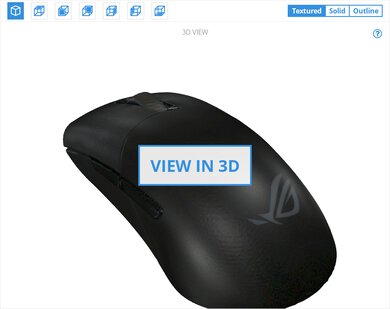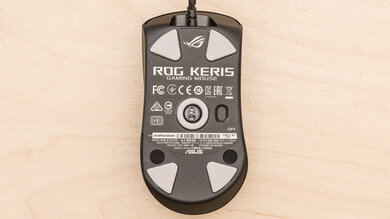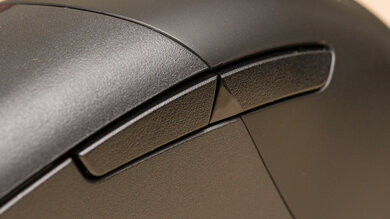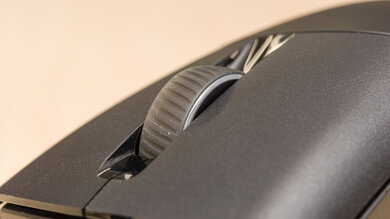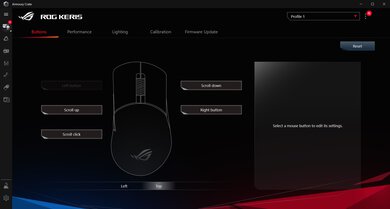The ASUS ROG Keris is an excellent ultra-lightweight gaming mouse that feels very well-built. It has a right-handed shape suitable for smaller hands using a palm grip and nearly all hand sizes using a claw or fingertip grip. However, extra-large hands may drape over the front of the mouse using a claw grip. It has a flexible cable, mouse feet that glide smoothly on all surfaces, and hot-swappable switches for the left and right-click buttons. It also has a very consistent sensor, a wide CPI range, and a very low click latency. Unfortunately, you can only adjust the CPI by increments of 100, and while the lift-off distance is low, it's not as low as on some other mice.
Our Verdict
The ASUS ROG Keris is a decent mouse for office and multimedia work. It feels very well-built, and it has a comfortable right-handed shape. It has a good number of buttons you can program using the software; however, it's only compatible with Windows. Unfortunately, this mouse has no wireless connection options, and the mouse wheel lacks L/R tilt buttons and doesn't unlock for free scrolling.
- Very lightweight.
- Feels very well-built.
- Wired-only.
- Mouse wheel lacks L/R tilt buttons and doesn't unlock for free scrolling.
The ASUS ROG Keris is an excellent FPS gaming mouse. It feels very well-built and has a comfortable, right-handed shape well-suited for a claw or fingertip grip for most hand sizes and suitable for a palm grip for smaller hands. It has a very flexible cable, mouse feet that glide smoothly on all surfaces, a wide CPI range, and a very low click latency. Unfortunately, you can only adjust the CPI by increments of 100, and while the lift-off distance is low, some gamers may prefer it lower.
- Very lightweight.
- Feels very well-built.
- Very low click latency.
- CPI only adjustable by increments of 100.
The ASUS ROG Keris is a decent mouse for MMO gaming, but it doesn't have quite as many side buttons as a dedicated MMO mouse. That said, you can program all the buttons it does have using the companion software. It also feels very well-built and has a comfortable right-handed shape. Performance-wise it has a wide CPI range and very low click latency. Unfortunately, you can only adjust the CPI by increments of 100, and while the lift-off distance is low, it's not as low as on other options. Also, the customization software is only compatible with Windows.
- Very lightweight.
- Feels very well-built.
- Very low click latency.
- Not nearly as many side buttons as a dedicated MMO mouse.
- CPI only adjustable by increments of 100.
The ASUS ROG Keris is an excellent ultra-lightweight gaming mouse. It's very lightweight and has a comfortable, right-handed shape best-suited for a claw or fingertip grip. It also has a flexible paracord-like cable and mouse feet that glide smoothly on all surfaces. Performance-wise it has a wide CPI range, a very consistent sensor, and very low click latency. Unfortunately, you can only adjust the CPI by increments of 100, and some gamers may prefer a lower minimum lift-off distance.
- Very lightweight.
- Feels very well-built.
- Very low click latency.
- CPI only adjustable by increments of 100.
The ASUS ROG Keris is inadequate for travel use as it's bulky and may be difficult to slip into most laptop cases. It's also a wired-only mouse, making it cumbersome to use in tight spaces like buses, trains, or planes. Nevertheless, it feels very well-built and has a comfortable right-handed shape. All the default buttons function in Windows and macOS, and it has onboard memory, but the companion software is only compatible with Windows.
- Feels very well-built.
- Wired-only.
- Bulky; may not fit in most laptop cases.
Check Price
Differences Between Sizes And Variants
The ASUS ROG Keris we tested is black and it has no other color variants. There's also a wireless version of this mouse, the ASUS ROG Keris Wireless. You can see the label for our unit here.
Popular Mouse Comparisons
The ASUS ROG Keris is an excellent lightweight gaming mouse. Compared to its wireless counterpart, the ASUS ROG Keris Wireless, this mouse is nearly 15 grams lighter, making it a better ultra-light gaming mouse for FPS gaming. While the majority of the other lightweight mice we've tested have ambidextrous shapes, this mouse has an ergonomic, right-handed shape. However, it's also short, so it may not be a comfortable option for those with extra-large hands. Also, like many ASUS ROG mice, it has hot-swappable switches for the left and right-click buttons, and it includes a set of alternate switches in the box.
See our picks for the best lightweight mice, the best wired mice, and the best gaming mice.
The ASUS ROG Keris Wireless is a wireless version of the ASUS ROG Keris. You can use it wired or wirelessly either with its USB receiver or via Bluetooth. It also has a storage compartment for its USB receiver when it's not in use. Also, it has two pairs of alternate, colored side buttons included in the box. The wired-only version is significantly lighter and has a more consistent sensor, but doesn't it come with alternate side buttons.
The Logitech G PRO X SUPERLIGHT is a better ultra-light gaming mouse than the ASUS ROG Keris. It's lighter, and it connects wired or wirelessly with its USB receiver. It also has smoother gliding mouse feet, a wider CPI range, a more precisely adjustable CPI, a lower lift-off distance, and a marginally lower click latency. It also has customization software compatible with Windows and macOS, while the ASUS has software compatible with Windows only. The ASUS also is a wired-only mouse. It has a more flexible cable as well as hot-swappable left and right-click switches.
The Logitech G Pro Wireless and the ASUS ROG Keris are comparable ultra-light gaming mice. The Logitech connects wired or wirelessly with its USB receiver. It also has a wider CPI range, a more precisely adjustable CPI, a lower lift-off distance, and two additional side buttons. It also has customization software compatible with Windows and macOS, while the ASUS has software compatible with Windows only. However, the ASUS also has a lower weight, better quality mouse feet, and hot-swappable switches for the left and right mouse click buttons.
The Razer Viper Mini and the ASUS ROG Keris are comparable wired gaming mice. The Razer is a bit lighter and has better click latency. It also lets you assign a G-Shift button that allows you to enable a secondary layer of commands. Comparatively, the ASUS has a wider CPI range, a more consistent sensor, and hot-swappable switches for its left and right-click buttons. Both mice are well-suited for smaller hands using a palm or claw grip and all hand sizes using a fingertip grip. However, the ASUS is also suitable for large hands using a palm or claw grip.
Test Results

Note: The paracord-like sheathing on our cable was damaged out of the box as it was stuck to the velcro cable tie it was wrapped in.
The available polling rates on this mouse are 125Hz, 250Hz, 500Hz, and 1000Hz. If you're interested in a mouse that's similarly lightweight but has a lower minimum lift-off distance, check out the Mountain Makalu 67.
The ASUS ROG Keris has hot-swappable switches for the left and right-click buttons. It has ASUS ROG 70M Micro Switches installed by default, but a pair of alternate Omron D2F-01F switches are included. If you'd like a dedicated CPI-switching button below the scroll wheel, check out the Gamesense Meta.


